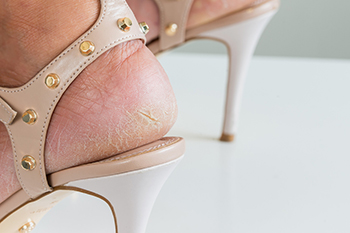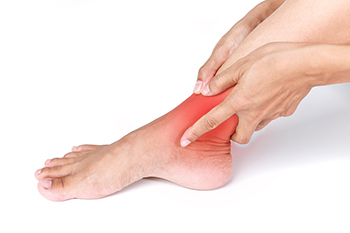
Cracked heels, which are a common foot condition, are usually non-threatening but can become potentially serious. It is best to try to prevent cracked heels from developing in the first place. It is a good idea to examine your heels and if they begin to feel dry, apply moisturizer regularly. Also, if you gain weight, the pressure on the heels increases and calluses may form. Extra weight, quite common among pregnant women, expands the heel skin while walking and standing and can cause cracks to widen. Wearing sling-back shoes, sandals, or flip flops also may cause the heels to dry out. Dried and cracked heels also can be a problem for those with diabetes, which can diminish the moisture supply to the feet. If the cracked skin on the heels does not improve with daily foot care precautions, they may deepen into fissures or begin to bleed. This opening of the skin can invite bacterial or fungal infections. An antiseptic lotion may help to keep the area clean. If cracked heels become an ongoing problem, it is suggested that you make an appointment with a podiatrist who can examine the area, and determine the best course of treatment.
Cracked heels are unsightly and can cause further damage to your shoes and feet. If you have any concerns, contact Dr. Kevin Davis from Davis Foot & Ankle Centers. Our doctor can provide the care you need to keep you pain-free and on your feet.
Cracked Heels
Cracked heels appear unappealing and can make it harder for you walk around in sandals. Aside from looking unpleasant, cracked heels can also tear stockings, socks, and wear out your shoes. There are several methods to help restore a cracked heel and prevent further damage.
How Do You Get Them?
Dry skin is the number one culprit in creating cracked heels. Many athletes, walkers, joggers, and even swimmers suffer from cracked heels. Age and skin oil production play a role to getting cracked heels as well.
Promote Healing
Over the counter medicines can help, especially for those that need instant relief or who suffer from chronic dry feet.
Wear Socks – Wearing socks with medicated creams helps lock in moisture.
Moisturizers – Applying both day and night will help alleviate dryness which causes cracking.
Pumice Stones – These exfoliate and remove dead skin, which allows for smoother moisturizer application and better absorption into the skin.
Change in Diet
Eating healthy with a well-balanced diet will give the skin a fresh and radiant look. Your body responds to the kinds of food you ingest. Omega-3 fatty acids and zinc supplements can also revitalize skin tissue.
Most importantly, seek professional help if unsure how to proceed in treating cracked heels. A podiatrist will help you with any questions or information needed.
If you have any questions, please feel free to contact our office located in Springfield, TN . We offer the newest diagnostic and treatment technologies for all your foot care needs.

More than half of pregnant women experience some type of foot problem. Common ailments can include collapsed arches, swelling, cracked heels, and foot pain. Fallen arches are largely due to a weight gain and the release of a hormone called relaxin. This hormone, which relaxes the ligaments in the feet and ankles as well as other body parts, contributes to the appearance of flat feet. A common complaint during pregnancy is swollen feet, which is the result of a buildup of fluid in the lower extremities. Pregnant women are cautioned not to stand for long periods of time, and to keep their feet elevated as often as possible. Heel pain caused by an inflammation of the plantar fascia can be treated by wearing shoes that have more arch support and ample cushioning. Certain exercises can also help to reduce the symptoms. Hormonal changes during pregnancy can cause the skin to dry out, and as it becomes more difficult to reach the feet to keep them properly moisturized, cracked heels may develop. These can become painful and lead to infection if ignored. If you are experiencing any foot problems during pregnancy, it is suggested that you make an appointment with a podiatrist.
Pregnant women with swollen feet can be treated with a variety of different methods that are readily available. For more information about other cures for swollen feet during pregnancy, consult with Dr. Kevin Davis from Davis Foot & Ankle Centers. Our doctor will attend to all of your foot and ankle needs.
What Foot Problems Can Arise During Pregnancy?
One problem that can occur is overpronation, which occurs when the arch of the foot flattens and tends to roll inward. This can cause pain and discomfort in your heels while you’re walking or even just standing up, trying to support your baby.
Another problem is edema, or swelling in the extremities. This often affects the feet during pregnancy but tends to occur in the later stages.
How Can I Keep My Feet Healthy During Pregnancy?
- Wearing orthotics can provide extra support for the feet and help distribute weight evenly
- Minimize the amount of time spent walking barefoot
- Wear shoes with good arch support
- Wear shoes that allow for good circulation to the feet
- Elevate feet if you experience swelling
- Massage your feet
- Get regular, light exercise, such as walking, to promote blood circulation to the feet
If you have any questions please feel free to contact our office located in Springfield, TN . We offer the newest diagnostic and treatment technologies for all your foot and ankle needs.

Ankle pain can be caused by various things. Arthritis is a common reason people may have ankle pain, and can wreak havoc on completing daily activities. Several types of arthritis can affect the ankle. Studies have shown osteoarthritis is the most common form of arthritis and is considered to be a chronic condition. When it affects the ankle, it is found at the point where the ankle meets the shinbone. Typical symptoms of this type of arthritis can consist of pain and stiffness, and the ankle may be difficult to move. The feet and ankles can also be affected by rheumatoid arthritis, which can happen when the body’s immune system mistakenly attacks the ankle joints. Juvenile arthritis can develop in people who are under the age of 16, who may notice their feet and ankles are painful and swollen. If you have ankle pain, it is suggested that you contact a podiatrist who can determine if arthritis is the cause and offer effective treatment methods.
Ankle pain can be caused by a number of problems and may be potentially serious. If you have ankle pain, consult with Dr. Kevin Davis from Davis Foot & Ankle Centers. Our doctor will assess your condition and provide you with quality foot and ankle treatment.
Ankle pain is any condition that causes pain in the ankle. Due to the fact that the ankle consists of tendons, muscles, bones, and ligaments, ankle pain can come from a number of different conditions.
Causes
The most common causes of ankle pain include:
- Types of arthritis (rheumatoid, osteoarthritis, and gout)
- Ankle sprains
- Broken ankles
- Achilles tendinitis
- Achilles tendon rupture
- Stress fractures
- Bursitis
- Tarsal tunnel syndrome
- Plantar fasciitis
Symptoms
Symptoms of ankle injury vary based upon the condition. Pain may include general pain and discomfort, swelling, aching, redness, bruising, burning or stabbing sensations, and/or loss of sensation.
Diagnosis
Due to the wide variety of potential causes of ankle pain, podiatrists will utilize a number of different methods to properly diagnose ankle pain. This can include asking for personal and family medical histories and of any recent injuries. Further diagnosis may include sensation tests, a physical examination, and potentially x-rays or other imaging tests.
Treatment
Just as the range of causes varies widely, so do treatments. Some more common treatments are rest, ice packs, keeping pressure off the foot, orthotics and braces, medication for inflammation and pain, and surgery.
If you have any questions, please feel free to contact our office located in Springfield, TN . We offer the newest diagnostic and treatment technologies for all your foot care needs.

